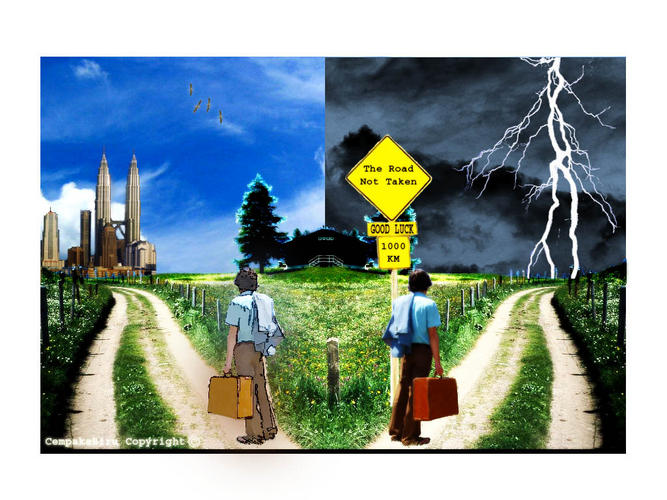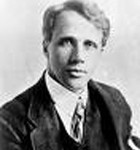Frosts poetry is a Metaphor for the ways in which we make sense of our lives
The ways in which people develop their imaginative landscapes, their attitudes and values and how they respond to the world around them are influenced by their sense of place. In analysing texts the landscape may be seen in literal or metaphorical terms. Places where we have lived and people we have lived with contribute to our outlook on life and how we respond to particular situations. For some people these memories stay with them throughout life. The imaginative landscape derives from the diversity of these experiences over the years. The physical landscape of a person’s life forms a literal and metaphorical yardstick with which to measure the passage of time and the acquisition of personal characteristics. The physical becomes intertwined with their imaginative landscape.
Robert Frost’s Imaginative Landscape
Encompasses both the beauty and dark side of the land and of human nature. While his love of the natural world is evident, inspiring him as a poet and a person, he does not romanticize it, rather he imbues it with strong moral tones, reflecting in his love of rural America.
As well as describing the physical world, Frost is also preoccupied with how the human figures are placed in the landscape and in time. His characters are aware of where they have come from and their history. They move in time from the past but also encompass the future. Frost’s imaginative landscape helps us to construct versions of ourselves by exploring where and who we have come from and who we might become.
‘The Road Not Taken’ Poem by Robert Frost

The speaker stands in the woods, considering a fork in the road. Both ways are equally worn and equally overlaid with un-trodden leaves. The speaker chooses one, telling himself that he will take the other another day. Yet he knows it is unlikely that he will have the opportunity to do so. He admits that someday in the future he will recreate the scene with a slight twist, he will claim that he took the less-travelled road.
One of the attractions of this poem is its archetypal dilemma, one that we instantly recognise because each of us encounters it numberable times, both literally and figuratively. Paths in the woods and forks in the roads are ancient and deep-seated metaphors for life, its crises and decisions. Identical forks, in particular, symbolise for us the nexus of free will and fate. We are free to choose, but we do not really know beforehand what we are choosing between. Our route is, thus, determined by an accretion of choice and chance, and it is impossible to separate the two.
The Fourth Stanza Holds the Key to the Poem with 2 Tricky Words
“I shall be telling this with a sigh
Somewhere ages and ages hence:
Two roads diverged in a wood, and I –
I took the one less traveled by,
And that has made all the difference”.
Those who interpret this poem as suggesting non-conformity take the word “difference” to be a positive difference. There is nothing in the poem that suggests that this difference signals a positive outcome. The speaker could not offer such information, because he has not lived the “difference” yet.
The other word that leads non-discerning readers astray is the word “sigh”. By taking “difference” to mean a positive difference, they think that the sigh is one of nostalgic relief. However, a sigh can also mean regret. There is the “oh, dear” kind of sigh, but also the “what a relief” kind of sigh. Which one is it? We do not know.

If the the sigh is one of relief, then the difference means the speaker is glad he took the road he did. If the sigh is one of regret, then the difference would not be good, and the speaker would be sighing in regret. The speaker of the poem does not even know the nature of that sigh because that sigh and his evaluation of the difference his choice will make are still in the future. It is a truism that any choice we make is going to make “all the difference” in how our future turns out.

